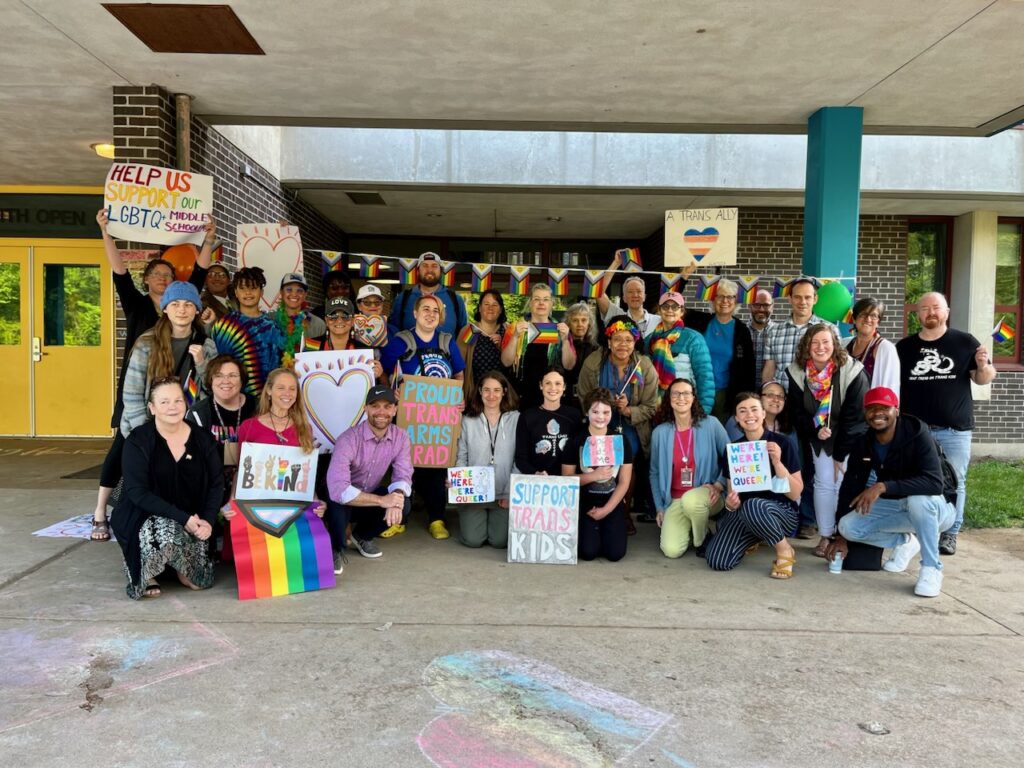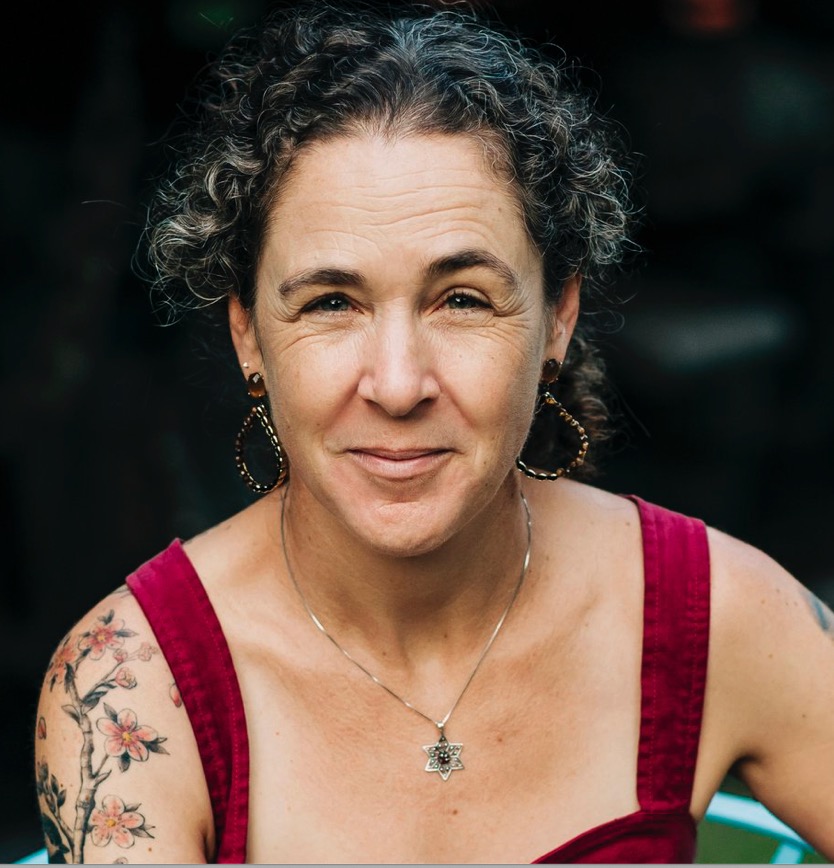Opinion: Protecting The Wrong People In Amherst

Hundreds of community members participated in a standout at Amherst Regional Middle School on Friday May 12, greeting students as they arrived to start the school day and demonstrating support for LGBTQA+ students and staff. A small number of those who participated posed for this photo following the standout. Photo: Rachelle Hall
This column appeared previously in the Daily Hampshire Gazette and the Amherst Bulletin

[Note: This piece had already gone to press when Mike Morris sent out a community email on 7/20 that continues to create a narrative in which he is a steadfast ally to LGBTQIA+ children and their families. His actions, and inaction, have shown otherwise.]
On July 13, just as abruptly as he announced he’d be going on indefinite medical leave two months ago, Amherst-Pelham Regional Public Schools superintendent Mike Morris announced that he’d been “cleared to return to work.”
He referenced the community support he received during his leave but made no mention of a community in crisis, a vote of no confidence in his leadership, several active investigations, and the LGBTQIA+ children at the Amherst Regional Middle School who suffered harm on his watch.
Exactly one week before his return, the Regional School Committee held a virtual meeting. Several nearly identical written public comments were submitted in what appeared to be an orchestrated effort to create a narrative favorable to Morris. These comments, some of which the Gazette coverage quoted, are deeply concerning. Let me explain why.
Those defending Morris have understatedly but concertedly called into question the reliability and integrity of anyone calling for him to be placed on administrative leave until the investigations are complete. They have suggested that we are teaching our children “blame, reactivity, and scapegoating.” One of the writers added, “This can be an opportunity to teach them to pause, interrupt harm, listen, gather facts, respond, and repair.”
At first blush, “pause, interrupt harm, listen, gather facts, respond, and repair” sounds good to me, absolutely what I would hope we would model for our kids. Indeed, a world where we practice these things and teach them to our children would be, one would imagine, a world where harm is less likely to occur in the first place and is properly addressed when it does.
But by positing itself as the voice of reason — slow and measured — it subtly (or not so subtly) suggests that more urgent responses to reports of harm are somehow reactive and thus, untrustworthy or even unhinged.
A small number of folks in our community have been painting a picture that there is some unfounded, rushed call for accountability and that those of us who continue to speak to that are in some way “blaming and scapegoating.” But calling for accountability is the ultimate form of responding and repairing.
This is dangerous territory, and we must consider it closely and critically.
Context matters. In the context of the harm that has occurred due to Morris’ breach of leadership, this language is a manipulative form of silencing. It paints people like me and those who are unapologetically, unwaveringly focused on the well-being and safety of LGBTQIA+ kids as reactive.
Further, it carries on a pattern of protecting those in power rather than the people we should all be focused on protecting: the children. It casts doubt on those who are suffering — the impacted students, their families, and the teachers and staff whose efforts to intervene went unheeded — and instead creates a circle of care around the one person who could have stood up and interrupted harm as it was happening.
This is the same weaponizing of language that has shape-shifted through American history to undermine those who are angry, hurt, and asking to be heard, acknowledged, and respected.
Under the skillful and meticulous guidance of one of Amherst’s best teachers, the students in Sara Barber-Just’s journalism class conducted a painstaking and thorough investigation that they reported in the high school student newspaper, The Graphic. Their findings left me and many others in tears. The party line is that there are legal reasons for waiting for the “official” investigations to conclude before making determinations about Assistant Superintendent Doreen Cunningham and Morris. But the refusal to confront the obvious failings of our district leadership and to make excuses for them, i.e. “nobody is perfect,” is beyond troubling.
I urge readers to sit with the question: What kind of community are we really? No number of written statements affirming LGBTQIA+ students, in-school trainings, or other short-term approaches will matter if, at the end of the day, we don’t address the deeper, more systemic problems of our district.
Morris’s nonchalant return to work is antithetical to the values Amherst and ARPS claim to embody. Put aside your personal allegiances and ask yourself: Whose voices are we listening to?
Are you looking to protect the reputation of a district leader who has been effective for some people’s children while failing to respond to ongoing anti-LGBTQIA+ abuses in our schools?
And most importantly: What about the kids?
The same people preaching that we should “pause, interrupt harm, listen, gather facts, respond, and repair” have not done any of those things, including Mike Morris himself. To defend Morris while speaking of repair is the height of hypocrisy.
Jena Schwartz is a writing coach, editor, and author of three books. Her poetry and essays have been widely published, and she has served as Poet in Residence at the Jewish Community of Amherst.

Thank you, Jena, for this critical piece. You have put into words what so many of us have been feeling.
Mike Morris can be a good person with good intentions and “care deeply about every student, staff member, and family in our schools” but the fact remains that as leader, he failed to protect children and we now know that a number of children were significantly harmed as a result of his inaction.
Surely t he top role of a school superintendent is to ensure the safety of the children in the schools. Whatever Morris’ reasons were to fail to take appropriate action to interrupt and stop the harm being caused by the three counselors and the assistant superintendent, at the end of the day his inaction meant he chose to protect those adults who were perpetrating the harm over protecting children. To swan back into the top job without so much as an acceptance of his role and responsibility in this crisis, sending an email that talks about the need to “expand our training for faculty and staff and our learning opportunities for students,” is unforgivable.
Holding him accountable is the role of the School Committee but so far it seems most of them are unwilling to do that. I am so grateful for Jena and all others who are repeatedly calling for accountability and repair. This is the time for every resident in the four towns of the regional school district to decide where they stand. As Jena says, who are you protecting? A district leader who failed to respond to ongoing anti-LGBTQIA+ abuses in our schools, or the children?